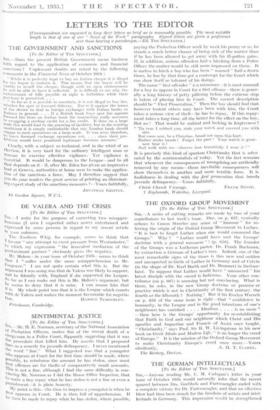SENTIMENTAL JUSTICE
[7'o the Editor of Tim SrEcrATort.1
81a,-----Mr. H. E. Norman, secretary of the National Association of Probation Officers, makes fun of the recent death of a Oecgyman in a Police Court, flippantly suggesting that it was the Proeedtiie that killed him. He asserts that I proposed Ernes as a remedy for juvenile delinquency. I never mentioned the Word. " fine." What I suggested was that a youngster IYho appears at Court for the first time should be made, where Possible, to reimburse the amount he has stolen, since most &t offences are for thefts of comparatively small amounts. This is not a fine, although I find the same difficulty in eon- Al-tieing Mr. Norman as I did the Home Office Inspector, that t-0 Make a boy repay what he has stolen is not a fine or even a lainishinent—it is plain honesty. My point is this—the time to-impress a youngster is when he ,lest appears in Court. He is then full of apprehension. If lie then be made to repay what he has stolen, where possible,. paying the Probation Officer week by week his penhy or so, lie stands a much better chance of being sick of the matter than if he has been allowed to get away with his ill-gotten gains. If, in addition, serious offenders had a birching from a Police Officer the matter would be still more impressed on them. It is useless to birch a boy who has been " warned " half a dozen times, he has by that time got a contempt for the Court which can show itself so tolerant of his doings.
The name " first offender " is a misnomer—it is most unusual for a boy to appear in Court for a first offence—there is gener- ally a long history of petty pilfering before the extreme step is taken of placing him in Court. The correct description should be " First Prosecution." Then the boy should find that however lenient others may have been with him, the Court takes a serious view of theft—he has to repay. If this repay- ment takes a long time, all the better for the effect on the boy. But no That would be unkind and lacking in forgiveness !
" 'Tis true I robbed you, stole your watch and covered you with dirt, But Dome now, be a Christian, brood not upon this hurt. • Rather strike hands ! Forget the past I Your watch is gone- now bear it !
And walk with me—observe how beautifully I wear it ! "
It is precisely this kind of spurious Christianity that is advo cated by the sentimentalists of today. Yet the fact remains that whenever the consequences of wrongdoing are artificially removed by any means—those inevitable consequences will show themselves in another and more terrible form. It is foolishness in dealing with the first prosecution that breeds juvenile delinquency.—Yours faithfully,
Christ Church Vicarage, FRANK STONE. 7 Esplanade, Waterloo, Liverpool.


























































 Previous page
Previous page